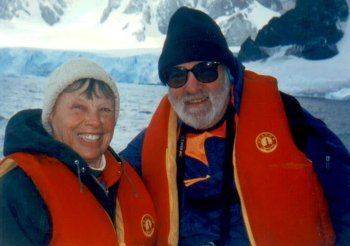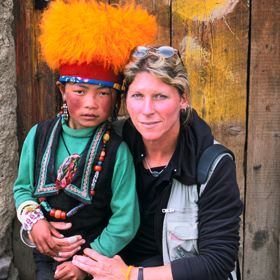 Years ago I had the great good luck to spend six months in Africa in the company of people who were born and raised there.
Years ago I had the great good luck to spend six months in Africa in the company of people who were born and raised there.
Most of this time was spent in game reserves and my experience was this: When I would first get to a reserve, the friends I was with would be pointing out animals and birds left and right, but I could rarely find them.
The reason? I had an untrained eye. So by the time I was able to zero in on where they were pointing, either the animal had fled or our Land Cruiser had moved on.
This inability to spot game usually lasted for the first day or two and then, like my friends who’d spent their lives in Africa, I found my eyes became better at tracking just through constant use.
To me, this is one of the great gifts of travel as opposed to tourism. Being on the road takes the skills we have and enhances them through the constant flexing of that muscle. In our everyday lives, we constantly problem-solve. But thankfully, most of the time, we are not facing crucial life and death decisions.
What’s different when we travel is this: Once we are out of our comfort zone, the problems seem to loom larger; they can come at us in unforeseen ways and in languages we don’t understand. And like my eyes that became better at tracking just through use, it seems to me our ability to problem-solve becomes stronger for exactly the same reason.
To test my theory, I did a grand scientific study of three people (including myself). I’d written about each of them before, for Grateful Traveler. Now I presented this scenario and asked them how they’d solve it: You arrive in a city—or a village or the middle of nowhere—late at night. You don’t know the language. You aren’t sure where you are. You haven’t figured out the money. Most importantly, there is absolutely nowhere to stay.
If you were to panic, no one would think less of you. But in most cases, “real” travelers don’t panic. Real travelers have spent years on the road, honing the very skills needed to get through a difficult situation calmly. The people I interviewed this past week about what they’d done in just such a scenario uniformly saw the situation as a challenge, but not as something scary. To them, it was just another problem to be solved.
 So here’s how each traveler solved it. Pat Herson (Grateful Traveler: Mount Bromo) did it the way she does everything—with good humor and a firm belief that everything would turn out fine. She said she never worried in difficult situations because she had a deep belief that everything would always be okay.
So here’s how each traveler solved it. Pat Herson (Grateful Traveler: Mount Bromo) did it the way she does everything—with good humor and a firm belief that everything would turn out fine. She said she never worried in difficult situations because she had a deep belief that everything would always be okay.
“I feel like a teenager when I travel,” said the 82-year-old traveler. “Nothing can touch me. Nothing can harm me. And so, there is nothing to be afraid of. I’ve never worried about anything happening to me, and it never has.”
Now if you were to meet Pat, what would strike you most about her is her irrepressible spirit. She’s not naïve. She doesn’t walk into new situations without preparation and study. But her spirit and deep interest in everything and everyone around her are so attractive and infectious, you just know she’s going to get through any situation and be just fine.
The photojournalist Alison Wright brought a different set of skills to the table. Used to traveling in dangerous conditions, she not only has an amazing problem-solving muscle she can flex almost without thinking, she also excels at what the author Malcolm Gladwell calls “thin-slicing.”
After years spent traveling throughout the world, Alison is a master at sizing up a situation in seconds based on very little information. She makes decisions quickly. Acts on them. And, most importantly, doesn’t second-guess herself.
 Of course, she can only do this because she has so much experience behind her. Even she is the first to admit that when she began to travel, she was always in survival mode. “I felt proud of myself at the end of the day, just for getting through it.”
Of course, she can only do this because she has so much experience behind her. Even she is the first to admit that when she began to travel, she was always in survival mode. “I felt proud of myself at the end of the day, just for getting through it.”
So here is Alison’s story. She was in Bolivia and all of her camera equipment was stolen. (Not good for anyone, but especially bad if you are a photojournalist). She tried to change her ticket to leave the country, but the airline said no. So she went to the market, bought a camera and got on a bus headed for her original destination. Or at least she thought that was the plan. Turns out, the bus was going the wrong way and, around midnight, she found herself at the Peruvian border without a Peruvian visa. She was in the middle of nowhere with nowhere to stay.
After everyone else had left, three big men (and Alison is tiny) emerged from the shadows and told her they’d drive her where she wanted to go. Alison debated between two bad choices, spending the night outside in the middle of nowhere or getting in a car with three strange men. She chose the latter. She got out a small knife she had with her and thought, if one of them makes a move for me, I’m going for the eyes.
“Sure enough,” says Alison, “we go a couple of hours and the driver stops the car and demands money. I flipped out. I told him I’d already been robbed once that day and there was no way it was going to happen again. I ranted and raved and refused to back down. The driver was so taken aback, he just started up the car and took me to where I wanted to go.”
Okay, so it’s not the solution everyone would pick, but Alison is fearless. She’s been in so many situations that were potentially dangerous, that she knew she could rely on herself. Years on the road had taught her that she could stay calm; meet challenges and work through them. And that’s just what she did.
 As for myself, as I mentioned in last week’s Grateful Traveler, I began to travel out of fear. I didn’t fit in, so I took to the road. Whenever I would find myself in some out-of-the-way place without anywhere to stay, penniless, and unable to speak the language, I would do whatever it took to keep myself feeling safe.
As for myself, as I mentioned in last week’s Grateful Traveler, I began to travel out of fear. I didn’t fit in, so I took to the road. Whenever I would find myself in some out-of-the-way place without anywhere to stay, penniless, and unable to speak the language, I would do whatever it took to keep myself feeling safe.
For me, that was always having a plan B. When I ended up in a Canadian town with no money and no place to stay, I thought, “I’ll go to the police. They’ll put me up for the night.” When it happened in a game park in Africa, I went up to total strangers and asked them to take me with them.
Like Pat, I certainly found my share of people reaching out in kindness—in fact, my experience being put up by Pakistanis in China kicks off the Grateful Traveler series. But unlike Pat, I was a lot more fearful. Hence, I could bear any situation, only as long as I knew I had a Plan B.
What is striking to me about each of our solutions is how much they reflect who we are. There is no single way to problem-solve one’s way out of a dilemma. Being true to yourself seems to help in meeting challenges head on. That, and to me, what I consider to be one of life’s great teachers, the constantly out-of-your-comfort zone classroom known as “the road.”
By Jamie Simons for PeterGreenberg.com.
Read more inspiring stories from the Grateful Traveler series:












